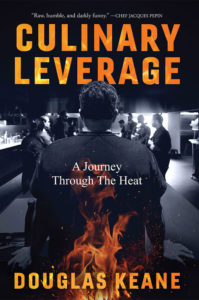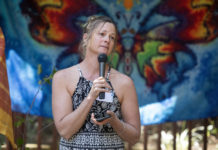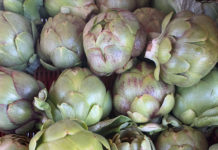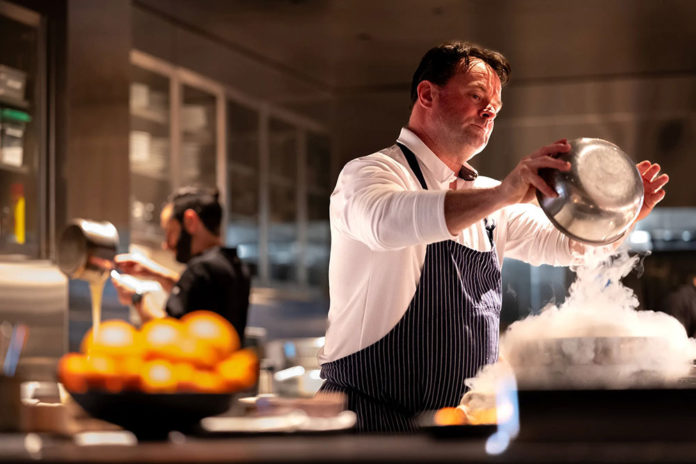
The Healdsburg Bar & Grill was overflowing that September night in 2013 as the crowd watched the finale of the final season of Top Chef Masters, the popular Bravo Network cooking show. In the running for the title was Douglas Keane, chef at the recently closed Cyrus restaurant at the Hotel Les Mars in Healdsburg, and at the time a co-owner of the HBG.
After the judges, in their usual teasing fashion, finally announced the winner, the room erupted in cheers and waiters passed champagne to celebrate: Doug Keane was the new Top Chef Master.
It felt like a vindication of the popular local chef, and a validation of Healdsburg as a true capital of cuisine on the national stage. And in winning the competition, Keane earned $120,000 for his preferred charity, Cloverdale’s Green Dog Rescue.
Following that Top Chef success, Keane attempted to find another location for Cyrus in the nearby Alexander Valley, but it wasn’t until 2022 he finally succeeded in opening “Cyrus 2.0” in Geyserville.
Keane has now written a revealing and insightful memoir, Culinary Leverage. Last week we spoke with the 56-year-old chef about the book, his interest in dog rescue, his opinion of social media, trendy restaurants and even induction cooking.
He will read from the book and demonstrate stovetop induction cooking at Sonoma Clean Power in Santa Rosa on Saturday.
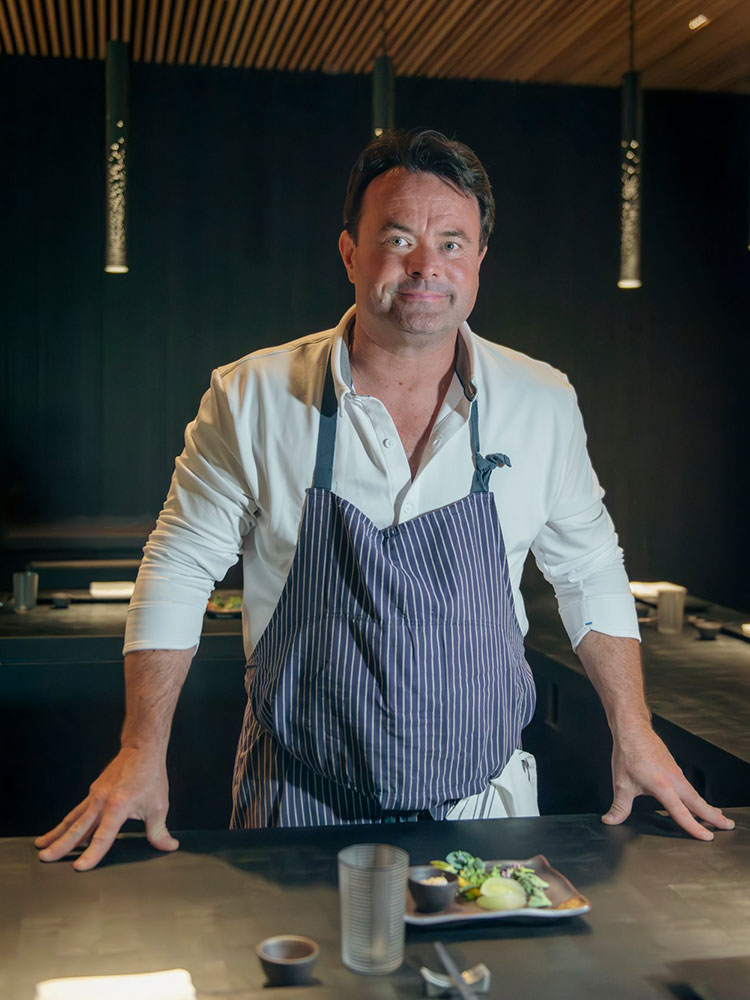
Tribune: Why are you going to be at the Sonoma Clean Power event?
Keane: They approached me about a year ago and asked me how I felt about induction cooking. I said, “Oh, we use it a lot. I’m a big fan of it. I’m not saying you should only use induction, but I love it.” They said, “Would you like to come do a cooking demo with us?” I said, “I’d be happy to. But I have a book coming out. I think it’d be better to time it together.” … So we’re going to do an interview about the book, and I’m going to show how to cook on an induction unit. It kind of seemed like it melded really well, my priorities and theirs, and it’s kind of a fun idea.
What is it you like about cooking with induction? How is it different?
It’s efficient. You can do something quick. It’s not messy, it’s a really clean style of cooking and there’s [enough] power to it that you can get something to boil a lot faster on induction than you can with gas … . So if you want to do something really quick, man, just pop it on the induction. It’s a different style of cooking.
I really enjoyed your book, Culinary Leverage. I thought it was honest about the business you’re in and your chosen career. And especially since it was so Healdsburg-centric, at least the second half. What motivated you or who encouraged you to write it?
I motivated myself. The honest answer to this is I thought I had a lot of weird, interesting stories that had happened to me, and I have a really great memory—detail always lived very vividly in me. Like, the smell of something or the way someone looked at me. I’ve always been able to recall things.
When I just started writing all these stories I said I want to do a memoir. A couple people said, “You’re too young for a memoir.” I’m like, OK, I want to do my book. You know, I do two of ’em. I don’t know. But I just had to start writing. And the interesting thing is, the [original] purpose of it was to tell the story of Cyrus in the end.
Maybe halfway through it, it kind of became clear what the true purpose of the book was. It was to tell the story about how to fix an industry. And how I was broken and got a little bit fixed, and how the industry is broken and hopefully can be fixed. And that’s what it became. And I think it was helpful to tell the story about all of my struggles because I think it kind of made it more real for everyone.
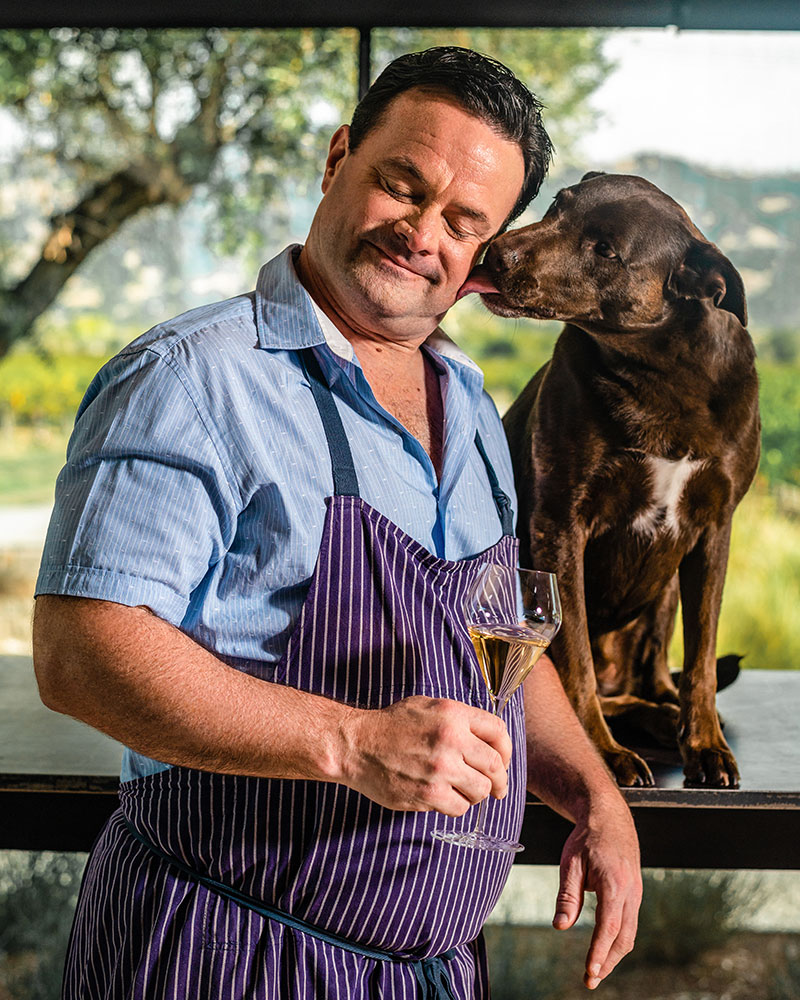
A significant part of your book is not about people at all, but dogs …
We all have our own oddities and kinks and stuff like that. Mine is the animals, the four-legged ones. They just kind of tend to be more honest and unconditionally loving. And it’s just always been a connection for me, it’s always been like a happy place. Dogs are not capable of lying. So you kind of have to take them at their word. They don’t know how to lie.
Another thing that jumps out is how important employee relations are in the kitchen, or how you’d like to see the restaurant business operate, with things like controlled hours, paid vacations and other perks not usually associated with the line cooks.
I’ve been talking about this concept for 10 years, since we closed the first Cyrus. It took us a lot longer to get this open just ’cause of circumstances and Covid and all that stuff, but I’ve been preaching this kind of thing to a bunch of people. So, there’s people that I have spoken with who have actually opened, like Hollis Silverman in Washington, D.C., she has three restaurants. The people in Minneapolis who do dinner at Bûcheron, they do something similar as well.
The Harvard Business School did a case study on us. I don’t know if you read James Heskett’s foreword in the book, but he came out here and studied us because the model was so intriguing to him as a professor in service management.
Do you have better retention in your employees, then?
Oh God, yes. It’s been moving fast, but we had our January break, our annual two-week break, and I think 75% of the employees were eligible for all two weeks. After one year, you get one week of vacation paid.
It sounds so odd for a restaurant to do that, but no other industry. Isn’t that odd? People get vacation paid in a lot of industries. That is one of the things that made me want to write the book. Why in this industry that’s supposed to be taking care of other people, why is the abuse or the dysfunction acceptable?
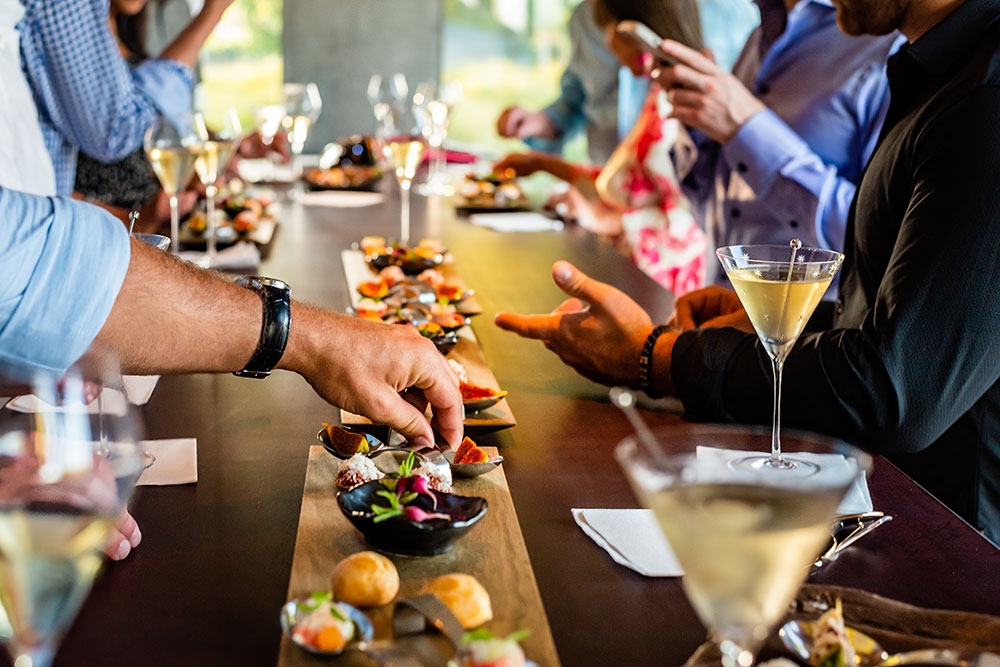
Some parts of the book take a pretty critical approach to some sacred ground—like when you slam St. Helena as “the epitome of privilege,” and say, “The elitists can take a million selfies and still not see themselves.”
It’s my book! Right? I’m going to say what I want to say. I mean, it’s not a publicist writing the book. My book is going to be honest, raw and me. I’m not saying I’m right all the time, but I am from my opinion … I just told it how it is, you know? I’m sure I won’t get a parade down Main Street in St. Helena any day soon.
It’s also clear you don’t appreciate people taking so many cellphone pictures of food. But as an artistic chef, you spend a lot of time on presentation and plating. So can you really blame a customer who, when this is the first time they’ve seen this plate, tries to save that appreciation with a photograph?
I actually appreciate you asking because it’s super valid. Yes. I actually can, and I do make a point to say, whip out your camera and take a picture at the end of the night. And I’m actually not saying don’t take a picture of something … . On a side note, I’ve been noodling in my head about how to actually make that unnecessary by possibly photographing the food, making it available for everyone at the end of the night.
But I’m not saying don’t take a picture. What I’m saying is, try to enjoy the meal and enjoy the person you’re eating with, because that’s more important.
Douglas Keane’s book, ‘Culinary Leverage: A Journey through the Heat,’ is published by Koehler Books (2025). ‘From Kitchen Heat to Written Word: An Afternoon with Chef Douglas Keane,’ will be held at the Sonoma Clean Power Customer Center, 741 Fourth St. in Santa Rosa on Saturday, March 29, at noon. There is a wait list.

